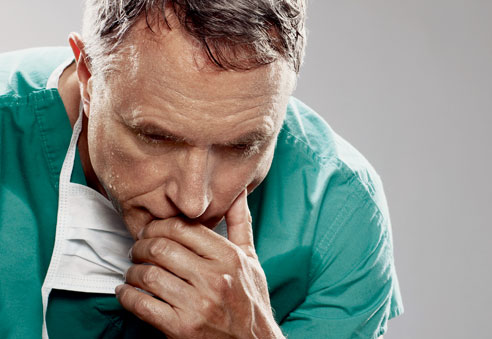"It was more than 20 years ago, but it still haunts me," says Bryan E. Bledsoe, a clinical professor of emergency medicine at the University of Nevada School of Medicine. "I made a mistake that may have cost a woman her life."
Bledsoe's oversight(疏忽), which you'll read about later, has driven him throughout his career. To this day, he is an outspoken(坦率的,坦言的) advocate(倡议人) for health care safety, teaching physicians-in-training to treat patients as individuals, not as numbers at a deli(熟食店) counter.

Doctors, nurses, and pharmacists hold your life in their hands. Here, their shocking stories of what can go wrong—and what has to improve to keep us safe.
It sounds like an obvious message, but an overemphasis(过分的强调) on speed is just one of the reasons that, every day, Americans in hospitals around the country are injured or die because of a medical error. "Any physician(医师) who says he or she never made a mistake is a liar," Bledsoe says.
The problem of avoidable medical error burst into(突然开始进入) the news in 1999 when the Institute of Medicine published To Err Is Human: Building a Safer Health System. Highlighting(强调,突出) an estimated 98,000 unnecessary deaths every year, the report inspired a patient-safety movement—but over a decade(十年) later, not nearly enough progress has been made, say many experts. What's still needed: more thorough approaches(方式方法) to investigating errors, support systems that help doctors admit to and learn from their failings, and better methods of adopting proven(经过验证的) solutions. In the meantime, people are still dying needlessly.
"If we don't talk about the problem of hospital error, there's no way to fight it," says Peter Pronovost, MD, PhD, a professor at Johns Hopkins University School of Medicine, whose own father died because of medical errors at age 50. "Whenever I've worked up the courage to share a personal mistake, my colleagues listen raptly(全神贯注地). But most don't say anything, even though I know they're just as guilty. The culture of medicine still won't allow it."
But that's changing. When Reader's Digest first considered approaching(接洽) health care professionals to ask them to confess their biggest mistake, we worried that few would speak up(畅所欲言). We were wrong.
Doctors, nurses, and pharmacists(药剂师) all stepped forward. Each of these professionals welcomed the chance to say "I'm sorry"—and, more important, to address the weaknesses in the health care system that continue to make errors like theirs possible.

